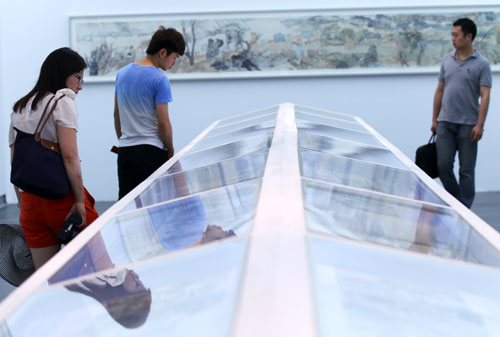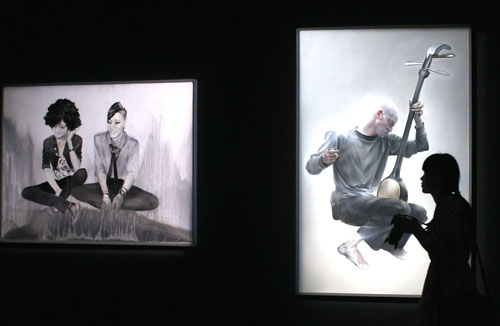
 |
|
Ji Yunfei's paintings, some over 10 meters long, focus on the effects of grand infrastructural projects and water-related natural disasters on ordinary people.[Photos by Zou Hong/China Daily] |
 |
|
Song Kun explores the quiet properties of natural materials. |
If at first sight you are not impressed by Ji Yunfei's paintings in the ongoing exhibition, Water Work, don't let that stop you from seeing the rest of his thoughtful expressions at Ullens Center for Contemporary Arts.
On wide expanse of rice paper, which is the artist's favorite medium of expression, the Beijing-born, New York-based artist paints a rich mix of classical Chinese-style landscape and modern satire with traditional Chinese painting skills and novel imagination.
Trained in oil painting at the Central Academy of Fine Arts, 50-year-old Ji made his artistic name in the 1990s as a painter working in Brooklyn, in the United States.
The artist's first solo exhibition in Beijing includes 14 of his works.
Though he has been living and working in the US for 30 years, his painting has always been about China. He even mixes Chinese classical art materials such as Chinese ink with watercolor, pencil, woodblock and etching on paper.
His subtle watercolors have appeared in important contemporary art events, including the 18th Sydney Biennale (2012) and the 11th Biennale de Lyon (2011), as well as shows at The Museum of Modern Art, New York. In 2005, the American Academy in Rome awarded Ji a Prix de Rome fellowship.
He is currently less known in China than in the West, but his ongoing show in Beijing might change that.
Water Work features the artist's new commissions and key works from the last decade, including several scroll paintings over 10 meters long. In the exhibition, Ji examines developments in America and China, focusing on the effects of grand infrastructural projects and water-related natural disasters on ordinary people.
"My works are meditations on the mountains and waters as the image of our own moral failures," he says.
Ji's paintings freely switch between the two nations, with some works addressing American events such as Hurricane Katrina, while others look at projects and events in China such as the Three Gorges Dam and the South-North Aqueduct.
Combining personal travel experiences with fictional elements, Ji's works are a social-environmental document of change and progress, using Chinese symbols to make universal statements.
From June 3 to July 15, UCCA also opens the works of Song Kun in an exhibition titled A Thousand Kisses Deep, which borrows the name of a song by Canadian singer-songwriter-poet Leonard Cohen.
The center alley of UCCA is dark with drifting lights across the walls and nave, which evoke emotional distance and make the paintings stand out.
Paired with an immersive video installation, this presentation showcases the latest practice of Song, one of China's most interesting young women artists, while exploring the quiet properties of natural materials and venturing into the land of desire.
Born in Baotou, Inner Mongolia, 1977, Song was a founding member of the artist group N12 during her studies at the Central Academy of Fine Arts, where she completed her master's degree in the oil painting department in 2006.
chennan@chinadaily.com.cn